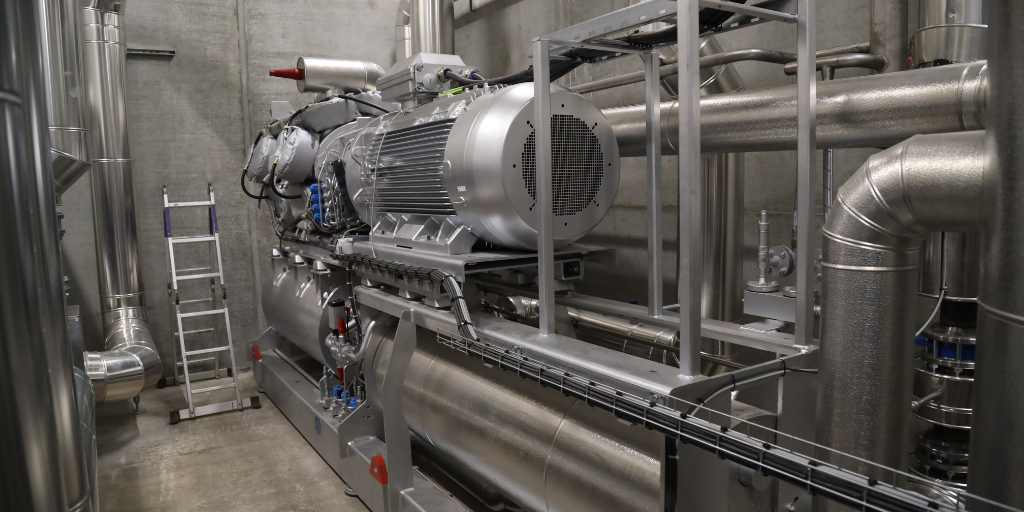This winter, surging energy costs serve as a stark reminder that we simply cannot rely on fossil fuels for heating. This is not just about finding energy sources at stable prices, but also significantly reducing carbon dioxide emissions, which make up 50 per cent of total emissions in the Western Balkans. There are better alternatives; district heating systems powered by renewable energy sources aren’t science fiction, but are in fact achievable right now.
In an effort to help five city officials from Western Balkan countries improve their district heating systems using sustainable models in Denmark and Sweden as examples, CEE Bankwatch Network, Aarhus Center in Bosnia and Herzegovina and Ekosvest in North Macedonia organised a tour with experts who work in the field. The participants – from the cities of Živinice and Tuzla (BiH), Pljevlja (Montenegro), and Kochani and Bitola (North Macedonia) – represent communities already interested in replacing outdated, polluting heating systems based on coal and fossil gas with newer, cleaner systems.
Over the past week, the officials had a chance to see a solar-based district heating network and a thermal energy storage site in the town of Marstal, as well as a system based on heat pumps at the Copenhagen market and the world’s largest fossil-free district heating grid in Lund, Sweden. Some of these systems have been in operation for almost 10 years and show how sustainable district heating can exist in the form of feasible, affordable and bankable solutions within the community.
Mayors and representatives of the local authorities shared their experience of shifting from heating systems that run on fossil fuels to others powered by renewable energy sources, including possible financing sources.
Although the circumstances differ from place to place, all these projects are evidence that overhauling heating systems pays off and local residents feel the difference in the air they breathe and the bills they pay. The experience of municipalities in Denmark and Sweden indicates that embarking on such a transition depends not only on the availability of financing, but primarily on political will. Governments of Western Balkan countries must embark on a dedicated energy transition to secure independent and clean heating solutions for their towns.
QUOTES FROM THE PARTICIPANTS OF THE STUDY VISIT:
Nataša Kovačević, District Heating Coordinator at CEE Bankwatch Network, said: ‘With the enormous gas price increase looming and upcoming taxes on carbon emissions, there has never been a better time to start developing modern and completely new district heating systems based on renewables. This requires supportive policies, a strong legal framework and the capacity to use all available financing mechanisms, including the EU, the Western Balkans Investment Framework, the European Bank for Reconstruction and Development and other funds from international financial institutions that are already available for all Western Balkan countries.’
Denis Žiško, Aarhus Center in Bosnia and Herzegovina, said: ‘It’s time to distance ourselves from the cavemen’s fascination with fire and accept that we don’t have to burn something to generate energy. The fact is that solar and wind energy combined with energy efficiency, heat pumps and heat storage are real, accessible and sustainable solutions for heating.’
Samir Kamenjaković, Mayor of Živinice Municipality, said: ‘The town of Živinice is committed to renewable energy sources, the circular economy and a just transition. The projects and plans that are already underway in Živinica have created the perfect platform for us to embark on projects and investments like those we have seen in Denmark, namely biomass projects and solar power plants.’
Ivan Chulakoski, City Councilor of Bitola Municipality in North Macedonia, said: ‘We had an opportunity to see with our own eyes that sustainable district heating can take different forms, but it is as feasible and affordable in Denmark and Sweden as it is in my town. Because Bitola is one of the most polluted cities in Europe, I think we must immediately prioritise this crucial transition.’
Dejan Rashkov, Secretary of the Municipality of Kochani in North Macedonia, said: ‘Kochani is currently developing a feasibility study for geothermal-based heating for the region’s agricultural area and a few urban locations. However, to fully develop this highly technical project, we need more substantial EU investments. Kochani has the advantage of having direct access to water at 78° Celsius, so we do not need to construct solar thermal storage facilities. However, heat pumps like those used in Marstal’s district heating system could increase efficiency and have a great positive effect on the local environment.’
Amel Husić, Chief of the Development Sector for Central Heating in Tuzla in Bosnia and Herzegovina, said: ‘The decentralisation and diversification of heat energy sources is extremely important for Tuzla’s district heating system needs to work on. The current global geopolitical situation shows that it is not good to be tied to one source of energy. On the study visit, we saw the city of Marstal, where solar collectors, thermal energy accumulation and heat pumps are all used in the district heating system. Each of these technologies is also applicable in Tuzla.’
Mervan Avdović, Executive Director of Heating Company ltd. in Pljevlja, Montenegro, said: ‘The visit was very successful; I saw with my own eyes technologies that I had only seen previously in energy magazines. I am grateful to CEE Bankwatch Network for enabling me to see all this. My task now is to try to apply everything I saw in my city and country.’
For more information contact:
Natasa Kovačević, CEE Bankwatch Network
natasa.kovacevic@bankwatch.org
Skype: natasa.green
Mob: +382 67 030 033
Denis Žiško, Aarhus Centre in Bosnia and Herzegovina
denis.z@bih.net.ba
Skype: denis.zisko
Mob: +387 61 140 655
Never miss an update
We expose the risks of international public finance and bring critical updates from the ground – straight to your inbox.
Theme: District heating
Location: Western Balkans | Denmark
Project: Coal in the Balkans | District heating
Tags: Balkans | district heating

